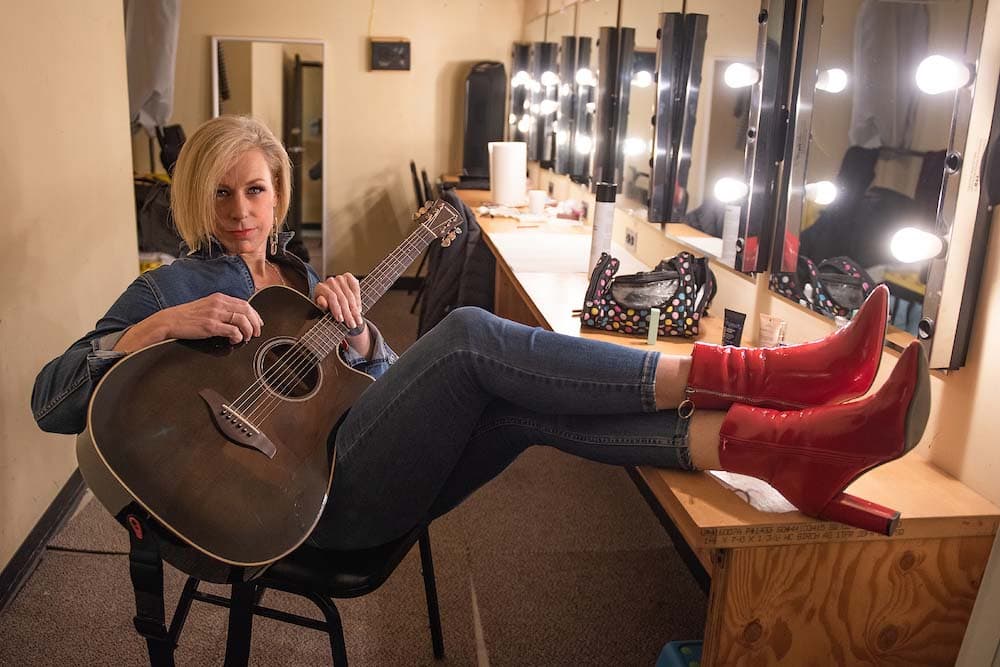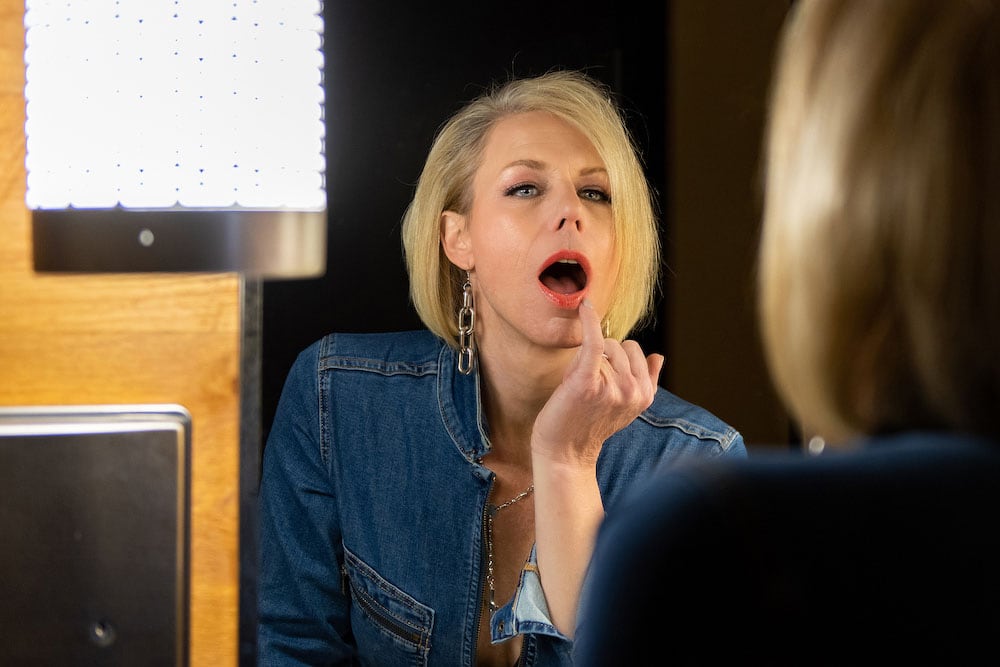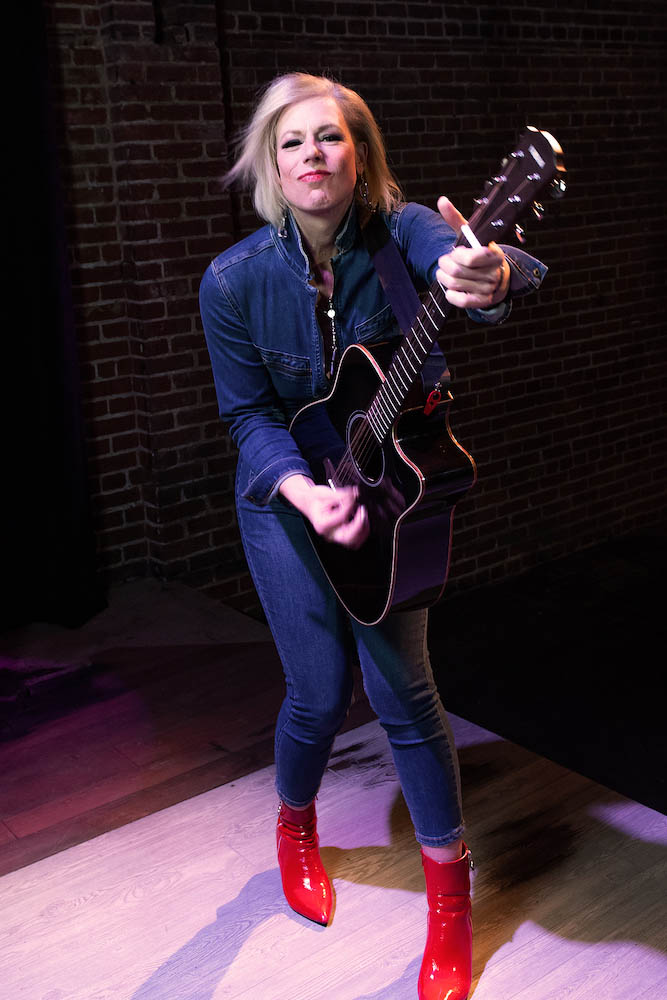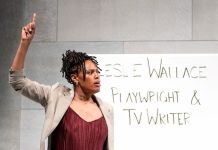The Keegan Theatre is premiering a ground-breaking live rock musical, Trans Am, written by and starring Lisa Stephen Friday, featuring the music of her glam rock band Lisa Jackson & Girl Friday, January 29 to February 26, 2022. I was lucky enough to see the November 2020 virtual version of Trans Am, which was a 2021 DCMTA Staff Favorite Digital Production.
You won’t want to miss the live version of Trans Am, Lisa’s one-woman autobiography. An actress and singer, Lisa is ambitious, driven, and trans. She shares her trans journey as a metaphor for the desire we all have for self-actualization, respect, and community. Lisa’s band, Lisa Jackson & Girl Friday, is a New York City cult favorite. Her story is funny, sad, inspiring, and devastatingly real. I was happy to have the opportunity to interview her.

Sophia: How did Trans Am come to be?
Lisa: I hadn’t auditioned or done anything except a couple of shows with my band in 15 years, and I was thinking I should look into theater again. I saw that Keegan was going to do Hedwig and the Angry Inch. I thought I should audition. In 1998, when Hedwig was in its original off-Broadway run, I was one of the actors called in for the replacements. I was pre-transition and I still had a lot of internalized transphobia and I never went in for the audition because I was afraid of it. I canceled once I saw the script. I was too immature, I wasn’t ready. Now, 20 years later, I come to Keegan, I do the audition, and they cast me as Hedwig.
Then the pandemic hits. During the pandemic, I started looking into Black Lives Matter. Addressing my own racism and what I was being silent about made me realize how silent I was about my trans-ness. It’s been 18 years since I transitioned. I have my job, I have my home, I’m living my quiet little life. It woke me up. The result was I approached Keegan. I started out doing a concert there with storytelling for Pride in 2020. Whatever money we made went to Black-led social justice groups. Susan [Susan Marie Rhea, artistic director of the Keegan] was interested in doing a fall rep, and that’s when they commissioned me to do an elaboration on the singer-songwriter story I did, which then became the full-blown script of Trans Am.
I didn’t know you were commissioned. That’s great.
The truth is, I’ve never written a script before in my life. I’ve never written anything more than whatever essay I had to write to get through English 101. I had all these stories I had done and I had someone transcribe them for me. I used that to shape Trans Am. I was ready to tell my story up to that point in my life because it just poured out of me. It was an incredibly cathartic experience.
I write about the Parkside Lounge [a club in the East Village]. I talk about Lavinia Co-Op, one of the greatest Fairy Queens in New York, and how we spent time together painting apartments and stuff. It made me so happy and grateful for experiences like that. Then I would write things about my family, and my divorce. I was literally sobbing as I was writing it. Fred Berman, who ended up directing the show and was helping me shape the story, would encourage me just to write. Not worry about grammar or spelling. There’s no way anyone else was going to be able to read it. It was gibberish. But I knew what I said, and I would go back and fix it all.
Well, you’re a natural.
Thank you! I don’t talk about this in the show, but I grew up a special ed kid. I was put into remedial reading and writing classes because I had a learning disability. I had an issue with reading comprehension and dyslexia.
A lot of talented writers have that.
Trans Am was the first time I realized this is just like songwriting. This doesn’t have to be something for people to read, I don’t need to be worried about this, I just need to speak and write, and let the train of thought come out; and when I felt permission to let go of the grammar and the spelling and all that, I was able to focus on storytelling — not, am I a good writer?
I think everyone who writes worries about being a good writer.
In January of last year, it was still on the docket that Keegan was going to do Hedwig, but there was some struggle getting the rights because Olney was going to do it, with Mason Alexander Park. Then Susan said, “We just want to do Trans Am anyway.” I was thrilled because I had lost interest in doing Hedwig. Hedwig is fantastic. I love John Cameron Mitchell and I love Stephen Trask, but that was 1998. I don’t need to retell that story. Hedwig paved the way to Trans Am. It opened up space for queer artists.
Were there other social justice movements that inspired you besides Black Lives Matter?
The National Trans Visibility March, an organization started in DC led by Black trans women. They shook me up a bit, saying, what am I doing with my white skin? Just the general chaos of the Trump administration. For me, the block against trans people in the military was enough; I didn’t need any other chaos surrounding it to say this is a human rights crime.
And with Black Lives Matter, I started to see my own laziness. Even if I don’t have outwardly racist behaviors but I’m not speaking out against the racist behaviors that I see, that’s part of the problem. And I was still seeing some of the transphobic behaviors that I wasn’t speaking out about. That was part of me upholding a system that isn’t inclusive of me.

You mentioned Keegan’s commitment to trans people and their stories.
Yes, in the last five years, with the social movements that are happening, calling for arts organizations to be more inclusive, Keegan has fully embraced that. It was a domino effect. First they sought out genderqueer and trans people for Hedwig, and then they turned to telling a trans story by a trans person. They were looking for new stories that are a reflection of our current social climate. And they were taking on the financial burden for artists, making the commitment clear; they are not expecting the artist to do it for free. They’re really being supportive of everyone who walks through the door.
That’s good to hear. Would you talk about your musical influences? You mentioned MTV.
Everything in the script is the truth, but I can’t say everything that’s influenced me. We’ve only got 90 minutes. I mention highlights, Freddie Mercury videos, for example. For me as a kid in the ’80s, living in Georgia, MTV was revolutionary. It was an obsession for me. A lot of what Boy George was doing was a reflection of things that were happening in New York or London or LA, with the club kids and all that.
You talk in the show about finding your brother’s guitar. How old were you when you found that guitar?
It was out in his room. We had a good relationship, it wasn’t like he was going to break my hands because I was in his room, but he didn’t want me in his room, touching his stuff. I was probably about 12 when I really started playing the guitar.
I can see the similarity between Black Lives Matter and the trans movement; both are a fight for equality.
Even in the gay community, there can be a lot of inequality. A huge part of the gay movement is cis white men who have all the privilege of a hetero man. They have the money and the education and the power to drive their social agenda. There’s a class of gay white men who live very well. And then there are all the rest of us.
Trans people, who were in the forefront of gay liberation, were quickly being removed. In 2003 and 2004 I was being asked to perform at marriage equality rallies. Specifically in Philadelphia, a huge marriage equality rally, I was one of the headlining events. But by the time the bill was signed and put into place, trans people had been removed. You use my voice, you use my presence, to promote your agenda, and then you remove me from your agenda. That’s why I feel the connection to Black Lives Matter, where they have been dealing with that kind of stuff for their entire lives.
Like the way Black women were treated during the suffrage movement.
And in the case of homophobia, we want to think of it as prevalent in the South, but it’s everywhere. It’s a part of our culture. It’s in our movies, it’s in our literature, in our churches, it’s in everything. In the East Village in the ’80s when I was there, the only place where there was truly a safe and nurturing environment was the nightlife, club subculture. That was the only place where there was complete freedom, equality across the board.
Which clubs are you talking about?
Parkside Lounge had a party going on called Cheez Whiz. That was the party for the party makers. On Sunday night, when everything was said and done, that’s where people came to have their cocktails, where Miss Guy would show up to hang out with her friends. Mistress Formika would show up, Lady Bunny, that’s where the cool kids were. That’s the kind of scene I talk about where as a trans woman there, with those people, they may or may not be trans, but they see each other. Those were the people who saw me, even before I really saw myself. They created space for me to become who I needed to become. Dean Johnson did the same thing at CBGB’s. Dean created HomoCorps [a monthly gay music showcase], which was the biggest party at CBGB’s for its last few years of life.
You talk in the show about safety. Is the stage a safe place for you?
I don’t know that it’s safe. It’s necessary. It’s risky for any performer to get on stage and be that vulnerable. It’s powerful, but it’s risky. You’re opening yourself up to be attacked, maybe not physically, but definitely emotionally.

Why do you think you are able to tell your story now?
I think the reason I was ready to tell my own story now was because I was able to write about my own flaws. I was able to see my own transphobia. And coming to understand the fact that of course I was transphobic, because I grew up in a society that breeds transphobia. So, there’s this huge hole that I have to crawl out of to find self-acceptance and self-love.
The two movies that came out when I was 20 were Ace Ventura [1994] and The Crying Game [1992], both horribly transphobic. In The Crying Game, this guy is dating this woman, he’s falling in love with this woman, they start to have sex, and when he discovers that she has a penis, his reaction is so intense that he vomits.
How awful!
This is a movie that’s informing me that my body is so disgusting that people are going to vomit when they see me naked.
And all I remember is the love story.
But it’s a love story with a condition.
In the end of Ace Ventura, they discover that the villain is a transgender person. They rip off her dress, and they see her penis and her panties, and everyone is laughing. At the freak-show aspect of it.
That’s terrible! And all I remember is, it was Jim Carrey, kind of funny.
These are major motion pictures. You have a room full of hundreds of people, and not one fucking person could stand up and say, This is a bad idea, this is dehumanizing and demoralizing to a certain class of people.
Are there any movies or shows that have a more positive image of trans people now?
Well, everyone who is interested in learning about what the media and the culture have done to trans people should watch Disclosure [2020]. It’s on Netflix.
That’s more positive?
I wouldn’t say it’s positive. It’s enlightening. It’s a documentary.
Are there any trans personalities or artists who particularly influenced you?
I would say the person who influenced me the most was Jayne County [transgender American singer, songwriter, actress, and record producer, 1947–]. She was doing everything I was doing, and a lot more. In 1975.
What would you say to a young person who thinks they might be trans, or is questioning their gender identity?
I think the most important thing is that young people find community. In New York, in the nightlife subculture, that’s what we had then. That’s the place you went to find your family. So, if they’re not getting the kind of affirming love and support that they need, as a non-binary or trans person, they should look elsewhere and trust that family is what you create. It is not who you were born to.
How can cis people become trans allies, and how can we help the trans community?
Correcting each other. When a trans person is in the room and that person is misgendered, the cis people need to correct each other, not let the trans person have to sit in that moment and have to advocate for themselves.
We don’t need allies. We need accomplices. We need people who will risk.
Let yourself be uncomfortable.
I always thought trans was all fabulous. A form of self-expression.
But that’s a slippery slope because that can lead to sensationalizing the trans person’s experience.
Or romanticizing it.
The key is to normalize it.
Do you think there has been progress?
Absolutely there has been progress. And the progress I see is in the kids. I see the kids who are 13 years old and coming out to their peers, and their peers completely supporting them. I have friends with kids, and I see the kids continually correcting their parents when it comes to breaking down gender norms. I think that’s all the result of the trans community pushing so hard. And shows like Pose [2018–2021) are putting trans people on television and showing the world that we’re here. We’ve always been here.

Is there anything you’d like to discuss that I haven’t asked you?
This show [Trans Am] and what Keegan is doing is absolutely what the future in theater should be. My story, as full of struggle as it is, is a reflection of the fact that I am a trans person who received love and respect from her chosen family. I am also the result of what happens when a trans person has access to health care and medical transition, because those things are affirming to my identity. Medical transition and gender-affirming health care should not be a luxury.
No, it should not.
In this country, you could smoke cigarettes your entire life and die of lung cancer, and your insurance company will pay for your hospital bills. You could be born a trans person, and need medical intervention, life-affirming medical services, yet it is considered a cosmetic procedure. This person will struggle their entire life with imposter syndrome and [gender] dysphoria, simply because our society does not believe that their needs are valid. It’s a human rights crime.
It’s telling that you received love and support from your community.
It’s affirming. It’s supportive. That is what is needed to help a trans person go from surviving to thriving.
How else can I help the trans community?
You’re doing that now by writing this interview. This is the work you’re doing.
It’s a pleasure to review your writing. It flies off the page.
In the reviews the first time around, the thing that made the most impression on me, that said you’ve created something good here, was when people talked about the writing. I’ve been a musician and a singer for a very long time. It’s always nice to get some accolades; I’m pretty comfortable with that. But when it came to people commenting on the script, the storytelling — like in Broadway World where they said, Lisa is very good at the turn of a phrase — it made me feel intelligent. I’m glad that you are commenting on the writing. That’s the most important thing I feel that I did here.
I hope that you keep going…
I’m trying.
I’m glad that you are. And I know that Trans Am, because I saw the online version, will be terrific!
Trans Am plays January 29 to February 26, 2022, with evening performances Thursdays to Saturdays at 8:00 pm and matinees on Sundays at 3:00 pm. at the Keegan Theatre – 1742 Church Street, NW, Washington DC. For tickets ($65), call the box office at (202) 265-3767 or go online.
COVID Safety: Masks and proof of vaccination are required. For the Keegan Theatre’s complete policies and procedures around keeping patrons, artists, and staff safe and healthy this season, visit their Health & Safety page.
SEE ALSO:
Review of the 2020 digital production of Trans Am by Sophia Howes




